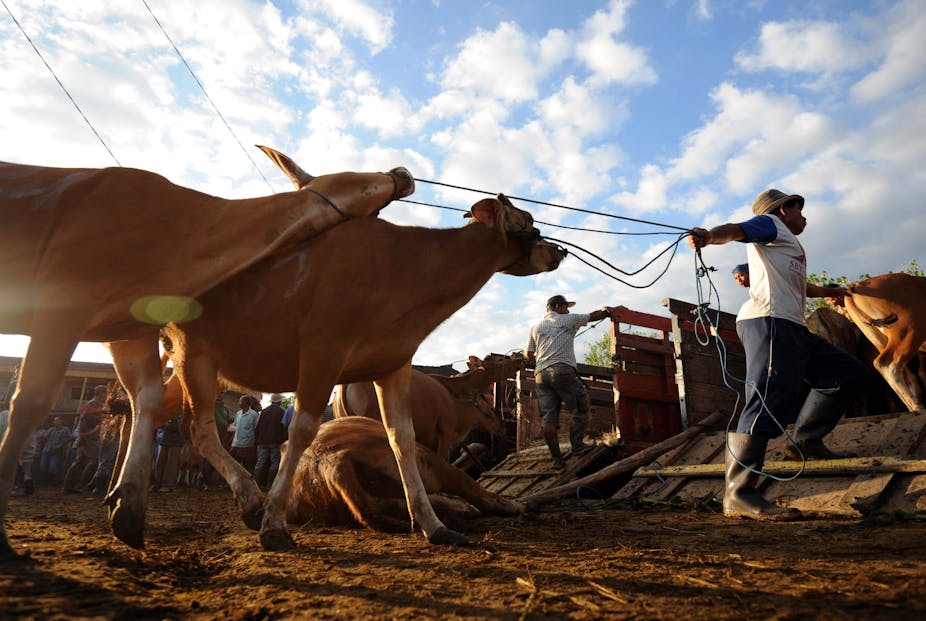The suspension of live cattle exports to Indonesia will also have significant implications on Australian cattle farmers, Australian and Indonesian domestic markets, and on the trade relationship between us and our largest neighbour.
Indonesia has threatened to complain to the World Trade Organisation about the suspension, although it is far from clear whether this might be successful.
But it does raise important questions about the potential for trade regulation to enhance or block improvements in animal welfare standards around the world, especially in the developing world where standards tend to be lowest.
On the face of it, Indonesia could criticise Australia’s action as an improper trade barrier, arguing the protection of cattle welfare is not legitimate grounds for setting up such a barrier.
However, as was shown in the WTO’s 1998 decision on a US ban on shrimp importation, known as the shrimp-turtle case, there is provision in WTO rules and instruments for such trade restrictions to be established as long as they are not discriminatory.
In this case, the WTO upheld a complaint brought by India, Malaysia, Pakistan and Thailand against a US law prohibiting the importation of shrimp harvested by the use of purse-seine nets.
The US law was enacted because that harvest method also harmed endangered sea-turtles.
The WTO’s final decision found that the purpose of protection of an endangered species was a legitimate basis for a trade barrier, based on environmental principles.
But the complaint was upheld because of discriminatory treatment by the US towards the complainant countries.
The US had assisted some Latin American countries develop turtle-friendly fishing methods, but had not extended the same assistance to the Asian countries who lodged the complaint.
Moreover, it is important to note that the WTO expects that countries, especially developing countries, are given time and assistance to comply with these types of trade regulations.
This case has some important implications for whether Australia’s action in suspending live cattle exports to Indonesia, can be defended from a complaint to the WTO, and whether the suspension is effective in dealing with the underlying problem of exporting live animals to countries that operate without the institutions of animal protection that Australians expect should operate.
To date, most animal protection issues considered by the WTO have come under the broad definition of “environmental principles”.
However, as cattle are scarcely an endangered species, a WTO ruling on the matter would have to turn to other principles.
Apart from environmental protection, the WTO also provides for trade barriers based on “moral exception” (GATT rule XX(a)).
We think the moral exception rule provides a principled basis for legitimating trade barriers concerned with animal welfare.
As with the shrimp-turtle case, it is the WTO’s non-discrimination rules that pose much more significant issues for current Australian policy.
However, these problems may also provide an opportunity to create much stronger animal welfare standards than has been contemplated to this point.
A problem with the debate as it currently stands is that it has focused on Indonesia, given that was the location featured in the media coverage. Other countries to which Australia exports live cattle (or sheep for that matter) have occasionally been alluded to, but the potential for WTO scrutiny over Australian export bans means we must consider the wider context.
It would be surprising if Indonesia were the only country where Australian live animal exports were subjected to abuse and poor welfare standards, given previous cases in the Middle East, for example.
The ABC’s Lateline program on June 8 interviewed a Meat and Livestock Australia manager Michael Finucan who is based in Jakarta, who explained in great detail how he and a small team of Australian colleagues had been working with Indonesian abattoirs for some time to improve their practices.
If such Australian support and assistance has resulted in what we now know about Indonesian practices, we are tempted to suggest it may well be in the welfare interests of cattle for that kind of support and assistance not to be extended to other countries.
But, putting aside the failure of the Australian government and industry to actually realise meaningful animal welfare change in Indonesia, for Australian regulation of livestock trade to withstand WTO scrutiny, our support and assistance to help importing countries satisfy our expectations about animal welfare will need to be both effective and even-handed in its distribution.
This is not just an ‘Indonesian’ problem, this is an Australian problem with how it regulates and manages its livestock trade to meet basic animal welfare objectives.
A sustainable and defensible response from government will need to move beyond a short-term suspension of trade with one country, to implementing a non-discriminatory regime of export regulation.
This should be backed up by more consistent and credible support and assistance than the industry scheme that has so comprehensively failed our cattle and our cattle producers in Indonesia.

